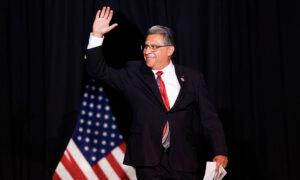Republicans say they hope to pass sweeping legislation on border security, energy policy, and tax reform as soon as possible.
WASHINGTON—House Speaker Mike Johnson (R-La.) says he and President-elect Donald Trump are working on strategy for the first 100 days of the incoming Republican-dominated government.
“I’ve been talking daily with the incoming White House. … President-elect Trump and I will be talking about this in depth this weekend before the Army-Navy game,” Johnson said during a Dec. 10 press conference.
He was referencing the upcoming Dec. 14 football game between the two military academy rivals at Northwest Stadium in Landover, Maryland. Trump and Johnson plan to attend the game.
Trump’s team has signaled that they hope to pass substantial legislative reforms on issues like border security, energy policy, and tax policy within days of Trump’s taking office.
Johnson said Republicans are ready to begin pursuing “an America First agenda … right out of the gates” following the transition of power in January.
That would include a “very aggressive first 100 days agenda,” Johnson said, referencing the “proverbial playbook” that Republicans have been preparing for over a year to implement legislation quickly.
Johnson didn’t address how leadership would handle their paper-thin majority in the House, which will fall as low as 217 seats—below the majority threshold for a full House—in the first couple weeks of the 119th Congress due to resignations by Trump appointees.
Such a thin majority still gives Republicans a slight edge over Democrats and would require effectively unanimous GOP support for any of these proposals.
The task would be easier in the upper chamber, where Republicans enter with a far more secure 53-seat majority to Democrats’ 47 seats.
Generally, large legislative changes on controversial issues stall in the Senate, where most legislation requires a 60-vote majority to advance to a vote on final passage. This has historically left the upper chamber deadlocked on major bills, with the system making it harder for wide-ranging legislation to pass into law.
However, the budget reconciliation system provides a tempting alternative.
Under budget reconciliation, legislation directly related to federal expenditures and revenues can bypass the upper chamber’s 60-vote hurdle: Reconciliation legislation requires only a simple majority in both chambers to pass.
The process traditionally is viable only when a party controls a trifecta of the House, Senate, and White House—a situation last seen during the Democrat-dominated 117th Congress that opened President Joe Biden’s term.
House Republicans and Trump himself are largely pushing for the first 100 days to include passage of an all-in-one budget reconciliation bill that wraps in border, energy, and tax policies—all pillars of Trump’s 2024 campaign.
Stephen Miller, Trump’s incoming deputy chief of staff, said the president-elect’s team is working with incoming Senate Majority Leader John Thune (R-S.D.) and Sen. Lindsey Graham (R-S.C.) to craft “the most significant border security investment in American history.”
“The bill will be transformational, it will be paid for, and it will go first,” Graham said, referencing support for passing the border legislation before moving on to other issues.
Miller said the border bill would include “a massive increase in ICE [Immigration and Customs Enforcement] officers” to carry out Trump’s plans for a massive deportation operation, “a historic increase in border agents,” a pay raise for ICE and border agents, and funding related to a series of other border investments related to barriers, detention beds, technology, and personnel.
Miller said he hopes such a bill could land on Trump’s desk as early as January or the beginning of February.
Afterward, Miller said, Thune plans to move “immediately” to a tax reform reconciliation bill.
That would include provisions on the State and Local Tax (SALT) deduction, for which Trump has expressed support, corporate tax and trade policy reforms, and manufacturing.
“Nobody is even talking or considering delay” on that tax bill, Miller said.
The goal, he said, was to pass these bills in as little as a few days following Trump’s swearing-in on Jan. 20.
This two-part approach backed by Thune—who will hold significant power over what comes to the floor and when—and apparently by Trump has faced some pushback among House Republicans.
That includes House Ways and Means Committee Chair Jason Smith (R-Mo.), who has said the border and tax packages should be passed as a single unit.
The all-in-one approach could force potential opponents of one bill or the other to cast an all-or-nothing vote. Some said that this can make it easier to pass.
On the other hand, with Republicans having only a tiny incoming House majority, even a handful of defectors could tank the bills if other Republicans join Smith’s demands for an all-in-one package.
Original News Source Link – Epoch Times
Running For Office? Conservative Campaign Consulting – Election Day Strategies!


